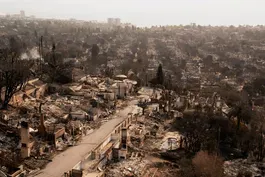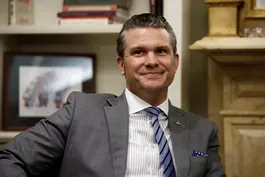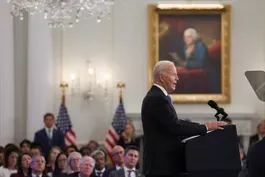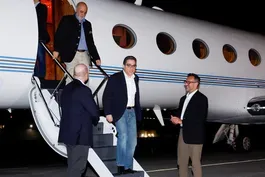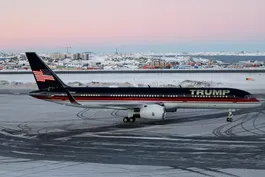
Ambassador says Canada prepared for any scenario with Trump
Clip: 1/13/2025 | 6m 22sVideo has Closed Captions
Canadian ambassador to U.S. on tensions with Trump: 'We are prepared for any scenario'
America’s close relationship with Canada is on full display in California where Canadian firefighters and water-dropping airplanes are helping with the wildfires. The assistance comes at a unique time as President-elect Trump is threatening to impose tariffs on Canadian imports and is dismissively calling Canada the 51st state. Amna Nawaz discussed more with Canadian Ambassador Kirsten Hillman.
Major corporate funding for the PBS News Hour is provided by BDO, BNSF, Consumer Cellular, American Cruise Lines, and Raymond James. Funding for the PBS NewsHour Weekend is provided by...

Ambassador says Canada prepared for any scenario with Trump
Clip: 1/13/2025 | 6m 22sVideo has Closed Captions
America’s close relationship with Canada is on full display in California where Canadian firefighters and water-dropping airplanes are helping with the wildfires. The assistance comes at a unique time as President-elect Trump is threatening to impose tariffs on Canadian imports and is dismissively calling Canada the 51st state. Amna Nawaz discussed more with Canadian Ambassador Kirsten Hillman.
How to Watch PBS News Hour
PBS News Hour is available to stream on pbs.org and the free PBS App, available on iPhone, Apple TV, Android TV, Android smartphones, Amazon Fire TV, Amazon Fire Tablet, Roku, Samsung Smart TV, and Vizio.
Providing Support for PBS.org
Learn Moreabout PBS online sponsorshipAMNA NAWAZ: America's long and close relationship with Canada is on full display in California this week, where our neighbors to the north dispatched firefighters and airplanes to help with the wildfires.
But Canada's assistance comes at a unique time, when president-elect Donald Trump is threatening to impose state tariffs on Canadian imports and dismissively calling Canada the 51st state.
Kirsten Hillman is Canada's ambassador to the United States.
She joins us now.
Ambassador, welcome to the "News Hour."
Thanks for being here.
KIRSTEN HILLMAN, Canadian Ambassador to the United States: Thanks for having me.
It's great to see you.
AMNA NAWAZ: Let me ask you about these comments from president-elect Trump calling Canada the 51st state, talking about annexing Canadian territory.
What is your response to those comments, and how are they resonating in Canada?
KIRSTEN HILLMAN: Well, I think that Canadians, to your second question, have enjoyed a little bit of teasing back and forth for a while.
There's a pivot more recently that's been a bit tougher, and I think that's probably landing less well.
But I think really what matters here is that the president-elect, he's a negotiator, and he's trying to set the stage for a discussion.
And he clearly wants to have a discussion with us around things that matter to him, like the border and perhaps other issues around the economy.
And we're ready for that discussion, and we're not -- I think it's important not to confuse maybe some of the dynamics of setting himself up for that discussion and really the substance that has to come next.
AMNA NAWAZ: You called it teasing and also this pivot.
And we should mention, after Prime Minister Trudeau announced that he was stepping down, it seemed like Mr. Trump doubled down on a lot of that language.
He's also talked about using economic force to annex part of Canada.
He's talked about buying Greenland, controlling the Panama Canal.
I mean, what do you make of all that expansionist language?
Is it posturing or is there a real threat there?
KIRSTEN HILLMAN: Well, I can't speak for Greenland or Panama, but, for Canada, my impression is -- and we talk to people around him, and we worked with him.
I have been ambassador since the previous Trump administration and worked with him under the NAFTA, the renegotiation of the NAFTA.
I think he is -- as I say, he's a negotiator, and he has -- he's positioning himself for the beginning of those negotiations, as are we.
And I just look forward to actually getting down and talking substance with the United States.
AMNA NAWAZ: So, in terms of how you're getting ready, obviously, these two nations are each other's largest trading partners.
Mr. Trump is threatening 25 percent tariffs on all Canadian imports.
What would be the impact of tariffs of that size on Canada's economy, and how would Canada respond?
KIRSTEN HILLMAN: So, first, I think it's important to point out that, when this proposal, if you will, came from the president around potentially adopting 25 percent tariffs on all Canadian imports into the United States, it was on the basis of border security.
And since that time, we have listened to what he said, and we have put forward a very expansive $1.3 billion plan to buy new helicopters, additional physical resources, additional personnel.
We are proposing, and the U.S. incoming administration has reacted very positively to that, a Canada-U.S. task force, a strike force on the fentanyl crisis.
So we are trying to lean in to actually a cooperation, a partnership on a topic that's very important to us.
This border, it's got two sides.
It's as important for us for that border to be safe and secure and crime-free as it is for Americans.
So, just to put that on the table, that is our first effort in preparations for these discussions.
And for -- so far, the people we have been able to talk to about it, I think, are reacting -- like Mr. Homan, are reacting very positively.
The tariffs themselves would be very difficult.
Canada is the number one customer of the United States.
You sell more to us than you sell to any other country in the world, more than you sell to Japan, China, the U.K. and France combined.
So we are a very important source of sales and exports for American people, and, likewise, obviously, the United States is a very important customer for our products.
So it would be mutually very difficult.
It would immediately raise prices.
There's no question about that.
Prices at the pump would go up.
Prices across consumer goods would go up.
Prices for businesses would go up.
And it would be very, very difficult for us.
It would be very difficult for Americans as well.
AMNA NAWAZ: It's been reported that Canada is planning retaliatory tariffs as well.
What would those target?
KIRSTEN HILLMAN: Well, I don't think we can answer that yet.
I think we have to see what actually happens.
We are prepared for any scenario.
Last time, when the previous Trump administration put tariffs on Canadian steel and aluminum, we responded in a measured, equivalent way.
We didn't escalate, but we didn't back down.
And I think that Canadians expect that of their government.
So we will be prepared for any scenario.
But, honestly, it makes no sense for us to get there.
It makes no sense.
We are trying to make both our countries stronger.
We have mutual competitors.
We have mutual adversaries.
We should be working on really finding a way to lean into President Trump's agenda for energy dominance.
Canada, one-third of what we sell to the United States are energy products.
And those products keep the price of energy low in the U.S. so that's where we want to be paying attention.
AMNA NAWAZ: In terms of what's ahead, and I know you don't serve an individual.
You serve the office.
You serve your nation.
KIRSTEN HILLMAN: Yes.
AMNA NAWAZ: But, obviously, Mr. Trudeau is stepping down.
The Conservative leader, Pierre Poilievre, who's drawn comparisons to Mr. Trump, is poised to win an expected election in the spring.
What could that mean for the future of these two nations' relationship?
KIRSTEN HILLMAN: Well, in my experience -- and I have worked with the U.S. for almost my entire career under Conservative and Liberal prime ministers in Canada and under Democrat and Republican presidents here.
And we always work it out because it's so important.
So we will always do a lot together.
We have millions and millions of our citizens working together every day, and they're the foundation of the relationship.
And our leaders, they will serve those relationships because those relationships make both our countries stronger.
AMNA NAWAZ: Canada's Ambassador to the United States Kirsten Hillman.
Ambassador Hillman, thank you for being here.
KIRSTEN HILLMAN: It's a pleasure.
Thanks for having me.
Dangerous winds pick up as crews battle devastating LA fires
Video has Closed Captions
Dangerous winds pick up as crews continue to battle devastating LA-area fires (9m 46s)
Hegseth hearings to begin amid sexual misconduct accusations
Video has Closed Captions
Hegseth confirmation hearings to begin amid sexual misconduct accusations (7m 20s)
News Wrap: Biden defends legacy on world stage in address
Video has Closed Captions
News Wrap: Biden defends legacy on world stage in address at State Department (5m 37s)
Roger Carstens reflects on bringing detained Americans home
Video has Closed Captions
Hostage negotiator Roger Carstens reflects on his efforts to bring detained Americans home (7m 55s)
Tamara Keith and Andrew Desiderio on wildfire politicization
Video has Closed Captions
Tamara Keith and Andrew Desiderio on the politicization of the California wildfires (8m 18s)
What makes Greenland a strategic polar outpost
Video has Closed Captions
Why Trump wants Greenland and what makes it a strategic polar outpost (6m 24s)
Providing Support for PBS.org
Learn Moreabout PBS online sponsorshipMajor corporate funding for the PBS News Hour is provided by BDO, BNSF, Consumer Cellular, American Cruise Lines, and Raymond James. Funding for the PBS NewsHour Weekend is provided by...

